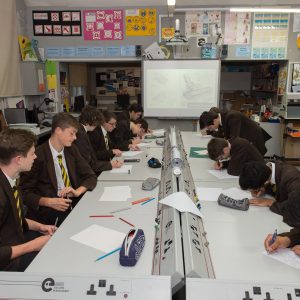Design Technology – Resistant Materials
Introduction
This GCSE follows the 2017 OCR specification for Design & Technology and builds upon the Design & Technology subjects studied at Key Stage 3 in Years 7, 8 and 9.
Design Technology Overview
As part of this GCSE, students will develop their knowledge and understanding of the ‘core’ Design and Technology principles with further focus on the ‘specialist’ area of Resistant Materials. They will also complete a controlled assessment project that is worth 50% of their GCSE.
Resistant Materials
What will it be like?
In year 9 and 10 students will complete a range of mini projects that have been designed to develop their knowledge and understanding of the principles, materials and manufacturing techniques commonly associated with the Design & Technology industries. Projects will include a range of design and make activities based on the ‘core’ and ‘specialist’ areas:
|
Core Design & Technology Principles |
Specialist Resistant Materials Principles (timber/ metal based materials/polymers) |
|
|

In Year 11, all students will complete a major project as part of controlled assessment that is worth 50% of the final GCSE grade. The project will require students to follow an iterative design process in order to produce a final concept prototype in response to the design challenge. As part of their projects, students will be required to:
- Conduct research using appropriate sources of knowledge including product analysis
- Generate and develop appropriate design ideas
- Evaluate the success of their design against the consumers’ needs
Career pathways
Many of our Design & Technology students go on to study A-Level Product Design to prepare for potential careers in Advertising, Architecture, CAD, Engineering, Graphic Design, Product Design, Media Design, UX/ UI (User Experience & User Interaction), Manufacturing and Textiles.
Assessment
- Final exam = 50% of GCSE
- Controlled assessment coursework = 50% of GCSE
The controlled assessment coursework is a single design and make project based on a design challenge set by the examination board. The challenge provides students with an area of focus (i.e. security of personal belongings) and give them the flexibility and freedom to develop a design of their own choice. Students will be timetabled in a Resistant Materials workshop for their practical sessions however they are free to explore and use any material in their final prototype.
All Design & Technology students sit the same examination paper which tests student knowledge of the ‘core’ principles and requires them to generate design responses linked to their specialist area.